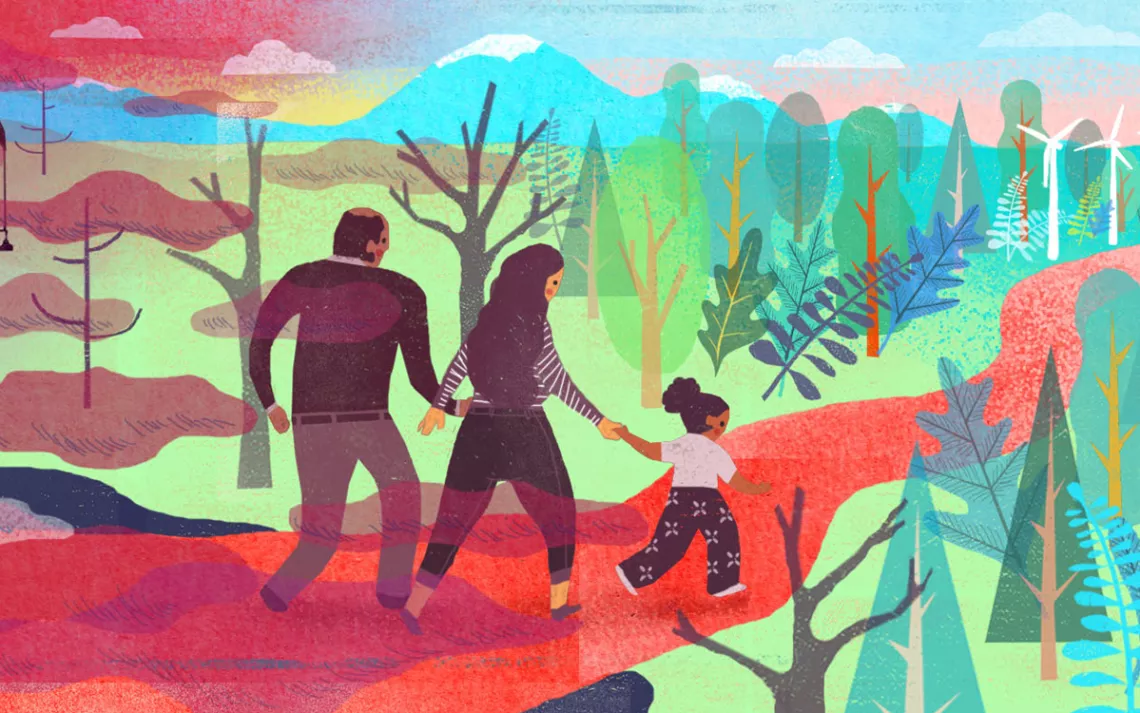We Need to Halt Greenhouse Gas Emissions While Also Preparing for a Hotter Planet
At this point in time, we have no choice but to adapt and prepare for climate change

Illustration by Simone Shin
The conversation about global warming is beginning to shift—and not necessarily in the ways you might imagine, or hope. Last October, while on the electoral campaign trail, I ducked into a conference on climate change in Miami, but it was really more of a "climate changed" gathering. Whereas most climate summits have an almost exclusive focus on cutting carbon pollution, most of the talk in South Florida was about how to adapt to an already changing climate. For many Floridians, especially those in the greater Miami area, the idea that climate change needs to be stopped has been overshadowed by the immediate necessity of staying dry. Rising sea levels are already on Florida's doorstep—and the state needs to begin preparing now for what's to come. Soon enough, adaptation will be something we're all wrestling with, and it's not entirely obvious how best to do it.
For decades, climate change policy has focused on mitigation—that is, cutting greenhouse gas emissions. Unfortunately, our mitigation accomplishments have been, at best, mixed, which means that we are now in the position of racing to make up for lost time. According to the UN's scientific experts, the world must cut climate-polluting emissions to 45 percent below 2010 levels by 2030—and by 2050 it must reduce them to zero. To do that, we'll need to, among other things, stop burning coal and natural gas, leave fossil fuel reserves in the ground, protect our forests and our soil, aggressively develop renewable energy sources, and electrify our transportation sector. It's a daunting list, but not impossible. The Sierra Club has been working overtime on almost all these things and plans to do even more.
But with deadly wildfires raging and extreme storms punishing our coastal communities, we can no longer assume that mitigation will be enough. Like Floridians, we're all going to have to think about how we will adapt to the changes underway. Some actions, such as moving people out of harm's way along coasts and floodplains and protecting wildlife corridors so that climate-stressed species can safely migrate, are just common sense, even if they're difficult steps to take. Same with finding ways to remove excess carbon from the atmosphere. By far the best method is to restore and preserve natural systems that suck up and sequester CO2. Regenerative agriculture, planting more trees, and protecting existing forests worldwide can all help draw down dangerous CO2 levels. Scientists, meanwhile, are beginning to investigate high-tech industrial methods for drawing down carbon. Such technology is a long way from being deployed, but if it is proved to be safe and economic, we'd be foolish not to use it—and even more foolish to rely on it alone.
How we choose to adapt to rising temperatures will have consequences, and it's not too soon to start thinking them through. For starters, not everyone has the same resources for adapting. That could lead to a world where only the affluent have the means to drink clean water, breathe clean air, and eat healthy food. Nations that can better afford to adapt (the same wealthy nations that are primarily responsible for this crisis) might selfishly choose inequitable adaptation strategies. Or they might shift their resources and political will from mitigation (which benefits everyone, including the poorer nations that had little to do with creating this mess) to a narrow focus on adaptation (to save their own skins). An emphasis on pie-in-the-sky techno-fixes could also lead to a "moral hazard"—the danger that placing our faith in tomorrow's potential solutions will reduce our will to solve the fundamental problem today. The last thing we want is for people to give up on taking action to stop climate change because they assume we can figure out ways to adapt to it.
No one's ready to write off Norfolk, Virginia, or Biloxi, Mississippi, much less Miami or New York. One way or another, we'll do both mitigation and adaptation. We'll have to build windmills and solar farms even as we're constructing seawalls and restoring shoreline wetlands. We must simultaneously construct a world that's powered by 100 percent clean energy and prepare for the consequences of having taken too long to get there.
This article appeared in the January/February 2019 edition with the headline "Making Up for Lost Time."
MORE
Read an interview with Sierra Club volunteer Arthur Feinstein, who is helping the organization prepare for sea level rise: sc.org/feinstein.
 The Magazine of The Sierra Club
The Magazine of The Sierra Club



